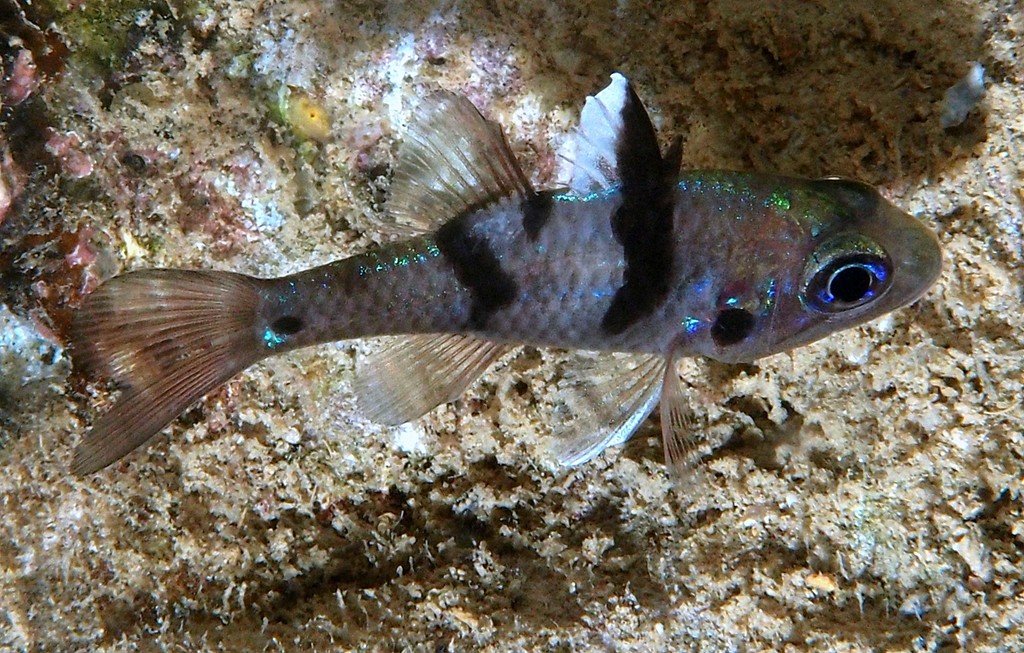PRISTICON TRIMACULATUS - (CUVIER, 1828)
Actinopterygii (Gigaclass) > Actinopteri (Class) > Teleostei (Subclass) > Gobiiformes (Order) > Apogonoidei (Suborder) > Apogonidae (Family) > Apogoninae (Subfamily) > Pristicon (Genus)
Cardinal à trois points, Three-spot cardinal, Three-spot cardinalfish, Three-spot cardinal-fish, Misuji-akahire-ishimochi, ミスジアカヒレイシモチ, 三斑天竺鯛, 大目側仔, Cá Sơn ba chấm,
Synonymes
Amia koilomatodon (Bleeker, 1853)
Apogon koilomatodon (Bleeker, 1853)
Apogon trimaculatus (Cuvier, 1828)
Pristicon trimaculata (Cuvier, 1828)
------------------------
Description
Dorsal spines (total): 7; Dorsal soft rays (total): 9; Anal spines: 2; Anal soft rays: 8. Body moderately deep, the depth: 2.45-2.7 in SL; Head length: 2.3-2.6 in SL; Snout length: 8.2-11.0 in SL; Orbit diameter: 6.3-9.6 in SL; Interorbital width: 10.5-13.4 in SL; Caudal peduncle depth: 5.5-6.7 in SL; Caudal peduncle length: 3.5-4.0 in SL. Mouth terminal, oblique, and large, the upper jaw length 4.55-5.15 in SL. Preopercular ridge smooth to a SL of about 60 mm, then becoming progressively more serrate (a 63-mm specimen has 5 tiny serrae at the angle of the preopercular ridge); Preopercular edge finely serrate, the serrae ranging from 33-mm specimen to 107-mm specimen; Posttemporal serrae varying from 3-19; Upper edge of suborbital shelf irregularly serrate, the lower edge above posterior end of maxilla with a few small serrae on large adults. First dorsal spine short: 9.15-13.5 in SL; Second dorsal spine longest: 3.75-4.4 in SL; Spine of second dorsal fin: 4.6-5.5 in SL; First and second dorsal soft rays longest: 3.0-3.75 in SL; First anal spine very small; Second anal spine: 4.6-5.55 in SL; Caudal fin forked with very broadly rounded lobes; Pectoral fins: 3.25-3.95 in SL; Pelvic fins reaching from slightly beyond anus to slightly posterior to origin of anal fin, their length: 3.3-3.9 in SL. Max. length: 14.2 cm SL, common length: 12.8 cm SL. Depth range: 1 - 35 m.
Color
Light grey or olivaceous to light brown with dark markings; At night some iridescent green may be present dorsally on head, body, and dorsal spines. Juveniles have intense dark markings on a light background. Adults dusky.
Etymology
Pristicon: from Greek, pristis = saw + from Latin, -con = with, together. Referring to serrated bones on head and the similarity with Pristiapogon genus.
trimaculatus: from Latin, tres = three + from Latin, macula = spot, stain. Referring to three clusters of black spots, one under each dorsal fin and a third one on tail.
Original description: Apogon trimaculatus Cuvier, 1828 - Type locality: Buro Island, Molucca Islands, Indonesia.
Distribution
Eastern Indian Ocean, western Pacific: Java (Indonesia), east to Tonga, north to Ryukyu Islands (Japan), south to northern Australia and New Caledonia.
Biology
Inhabits inshore coral reefs. Nocturnal species. Solitary, also found in reef crevices and ledges. Mouthbrooders. Distinct pairing during courtship and spawning.
Last update: 19, July 2024
Cardinal à trois points, Three-spot cardinal, Three-spot cardinalfish, Three-spot cardinal-fish, Misuji-akahire-ishimochi, ミスジアカヒレイシモチ, 三斑天竺鯛, 大目側仔, Cá Sơn ba chấm,
Synonymes
Amia koilomatodon (Bleeker, 1853)
Apogon koilomatodon (Bleeker, 1853)
Apogon trimaculatus (Cuvier, 1828)
Pristicon trimaculata (Cuvier, 1828)
------------------------
Description
Dorsal spines (total): 7; Dorsal soft rays (total): 9; Anal spines: 2; Anal soft rays: 8. Body moderately deep, the depth: 2.45-2.7 in SL; Head length: 2.3-2.6 in SL; Snout length: 8.2-11.0 in SL; Orbit diameter: 6.3-9.6 in SL; Interorbital width: 10.5-13.4 in SL; Caudal peduncle depth: 5.5-6.7 in SL; Caudal peduncle length: 3.5-4.0 in SL. Mouth terminal, oblique, and large, the upper jaw length 4.55-5.15 in SL. Preopercular ridge smooth to a SL of about 60 mm, then becoming progressively more serrate (a 63-mm specimen has 5 tiny serrae at the angle of the preopercular ridge); Preopercular edge finely serrate, the serrae ranging from 33-mm specimen to 107-mm specimen; Posttemporal serrae varying from 3-19; Upper edge of suborbital shelf irregularly serrate, the lower edge above posterior end of maxilla with a few small serrae on large adults. First dorsal spine short: 9.15-13.5 in SL; Second dorsal spine longest: 3.75-4.4 in SL; Spine of second dorsal fin: 4.6-5.5 in SL; First and second dorsal soft rays longest: 3.0-3.75 in SL; First anal spine very small; Second anal spine: 4.6-5.55 in SL; Caudal fin forked with very broadly rounded lobes; Pectoral fins: 3.25-3.95 in SL; Pelvic fins reaching from slightly beyond anus to slightly posterior to origin of anal fin, their length: 3.3-3.9 in SL. Max. length: 14.2 cm SL, common length: 12.8 cm SL. Depth range: 1 - 35 m.
Color
Light grey or olivaceous to light brown with dark markings; At night some iridescent green may be present dorsally on head, body, and dorsal spines. Juveniles have intense dark markings on a light background. Adults dusky.
Etymology
Pristicon: from Greek, pristis = saw + from Latin, -con = with, together. Referring to serrated bones on head and the similarity with Pristiapogon genus.
trimaculatus: from Latin, tres = three + from Latin, macula = spot, stain. Referring to three clusters of black spots, one under each dorsal fin and a third one on tail.
Original description: Apogon trimaculatus Cuvier, 1828 - Type locality: Buro Island, Molucca Islands, Indonesia.
Distribution
Eastern Indian Ocean, western Pacific: Java (Indonesia), east to Tonga, north to Ryukyu Islands (Japan), south to northern Australia and New Caledonia.
Biology
Inhabits inshore coral reefs. Nocturnal species. Solitary, also found in reef crevices and ledges. Mouthbrooders. Distinct pairing during courtship and spawning.
Last update: 19, July 2024
